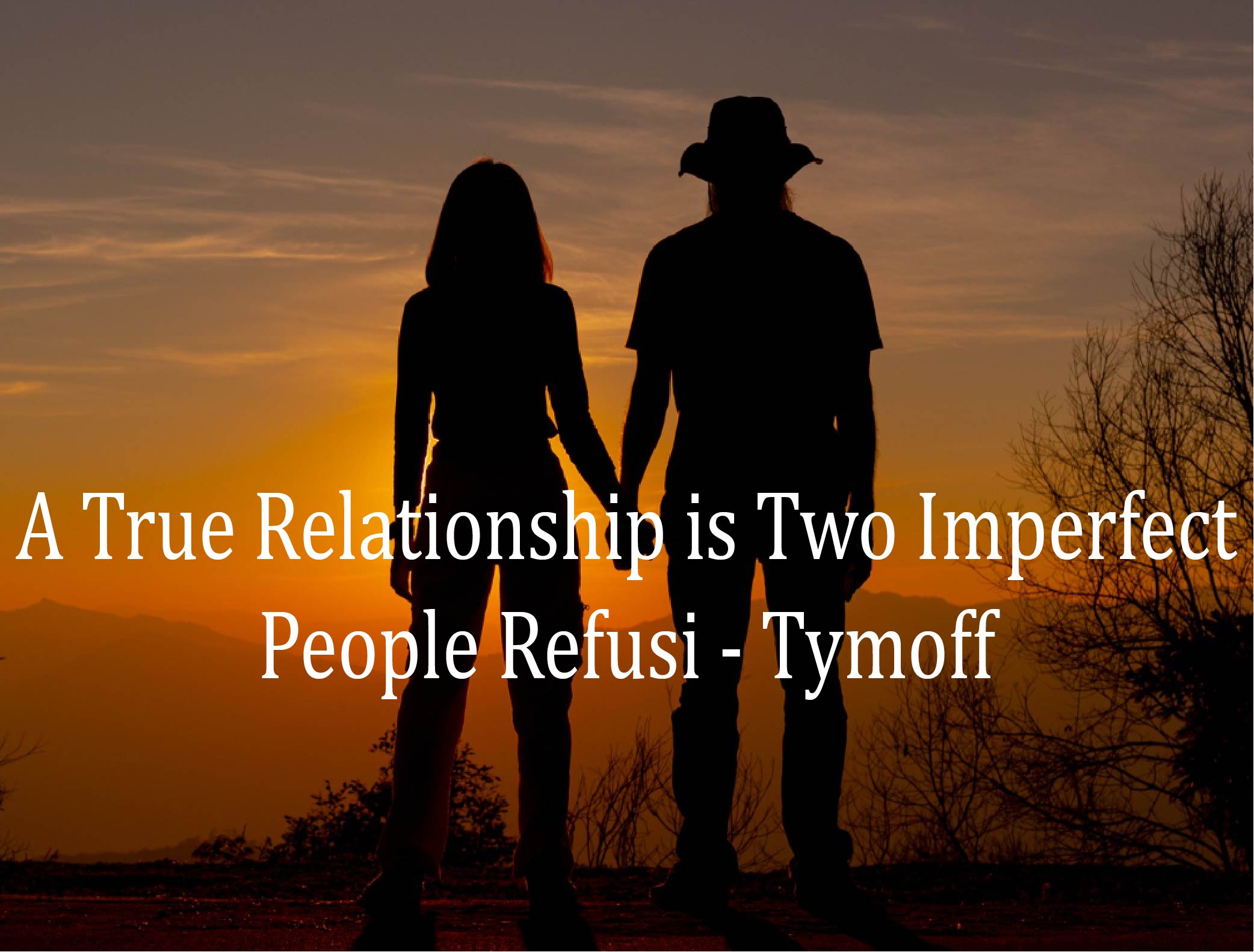introduction to a true relationship is two imperfect people refusi – tymofff
In the fast-paced world we live in, relationships can often seem like a puzzle that is difficult to piece together. Everyone desires the perfect relationship—a fairy tale romance with no flaws or hardships. Yet, the reality is much different. Relationships aren’t about perfection; they are about perseverance, patience, and mutual understanding. As the quote by suggests, imperfect people refusing to give up on each other.” This simple yet profound statement encapsulates the essence of what it means to be in a relationship that is genuine and lasting. a true relationship is two imperfect people refusi – tymoff
In this article, we’ll delve into the depths of what makes a relationship “true” and explore how imperfection plays a critical role in the strength and longevity of our connections with others. We’ll examine the importance of communication, the role of forgiveness, the necessity of personal growth, and how love evolves over time. Whether you’re in a relationship, seeking one, or reflecting on past experiences, this guide offers valuable insights into the beauty of imperfection and the power of persistence.
The Myth of Perfection in Relationships
The Illusion of the Perfect Partner
From childhood, many of us are inundated with stories of perfect love—fairy tales where the prince and princess live happily ever after without a single argument or moment of doubt. This narrative has shaped our expectations, leading us to believe that a relationship should be flawless to be successful. We search for the “perfect” partner, expecting them to fulfill every need, never disappoint us, and complete us in ways that may be unrealistic. a true relationship is two imperfect people refusi – tymoff
However, the pursuit of perfection in a partner is not only futile but also detrimental to the health of a relationship. Every individual has their quirks, flaws, and baggage. It’s essential to understand that these imperfections don’t make someone less worthy of love; instead, they are what make each person unique and capable of contributing to a dynamic and evolving relationship. a true relationship is two imperfect people refusi – tymoff
The Danger of Unrealistic Expectations
Expecting perfection from a relationship sets it up for failure. Unrealistic expectations often lead to disappointment when the reality doesn’t match the idealized version we’ve created in our minds. This disappointment can breed resentment, which, if left unchecked, erodes the foundation of trust and love in the relationship. a true relationship is two imperfect people refusi – tymoff
Instead of striving for perfection, it’s more productive to embrace the imperfections in both ourselves and our partners. A relationship becomes stronger when both people accept each other’s flaws and work together to navigate the challenges that arise. This approach fosters a deeper connection based on authenticity rather than an unattainable ideal. a true relationship is two imperfect people refusi – tymoff
The Power of Persistence: Why Refusing to Give Up is Essential
The Role of Commitment in a Relationship
Commitment is the cornerstone of any lasting relationship. It’s the conscious choice to stay together despite the imperfections, challenges, and obstacles that may arise. When two people commit to each other, they are agreeing to face whatever comes their way as a team. This commitment is not just about staying together physically but also about being emotionally and mentally present for each other. a true relationship is two imperfect people refusi – tymoff
Commitment requires more than just love; it demands dedication, effort, and a willingness to work through the tough times. It’s about showing up, even when things aren’t easy, and choosing to focus on the strengths of the relationship rather than its flaws. a true relationship is two imperfect people refusi – tymoff
Overcoming Challenges Together
Every relationship will face challenges—whether they are external, like financial stress or health issues, or internal, such as communication breakdowns or differing life goals. How a couple responds to these challenges often determines the success of their relationship. a true relationship is two imperfect people refusi – tymoff
When both partners refuse to give up, they demonstrate resilience and a commitment to finding solutions rather than walking away. This doesn’t mean that problems will always be resolved immediately, but it does mean that both people are willing to put in the effort to make things work. Overcoming challenges together strengthens the bond between partners and creates a sense of shared accomplishment that deepens their connection. a true relationship is two imperfect people refusi – tymoff
Embracing Imperfection: The Key to a True Relationship
Understanding and Accepting Each Other’s Flaws
No one is perfect, and that includes our partners. It’s easy to fall into the trap of focusing on a partner’s flaws, especially when conflicts arise. However, a true relationship requires us to accept our partner’s imperfections and recognize that these flaws are part of what makes them who they are. a true relationship is two imperfect people refusi – tymoff
Acceptance doesn’t mean turning a blind eye to issues that need addressing. Instead, it’s about recognizing that imperfections are a natural part of being human. By accepting these imperfections, we create a space where both partners can be themselves without fear of judgment or rejection. This acceptance fosters a deeper sense of intimacy and trust, allowing the relationship to flourish. a true relationship is two imperfect people refusi – tymoff
The Role of Vulnerability in Building Connection
Vulnerability is often seen as a weakness, but in the context of relationships, it is one of the greatest strengths a couple can have. Being vulnerable means being open and honest about our feelings, fears, and insecurities. It means letting our partner see us in our most unguarded moments. a true relationship is two imperfect people refusi – tymoff
When both partners are willing to be vulnerable, it creates a powerful connection based on authenticity and mutual understanding. This connection is the foundation of a true relationship, where both people feel safe to express themselves without fear of being judged or misunderstood. a true relationship is two imperfect people refusi – tymoff
Communication: The Lifeblood of a True Relationship
The Importance of Honest and Open Dialogue
Communication is often hailed as the key to a successful relationship, and for a good reason. Without honest and open dialogue, misunderstandings can fester, and small issues can grow into significant problems. In a true relationship, both partners prioritize clear communication, ensuring that they understand each other’s needs, desires, and concerns. a true relationship is two imperfect people refusi – tymoff
Effective communication is not just about talking; it’s also about listening. Active listening involves paying attention to what your partner is saying without interrupting or planning your response. It means being fully present in the conversation and showing empathy and understanding. a true relationship is two imperfect people refusi – tymoff
Navigating Difficult Conversations
Difficult conversations are inevitable in any relationship. Whether it’s discussing finances, expressing dissatisfaction, or addressing a sensitive topic, these conversations require tact, patience, and a commitment to resolution rather than conflict. a true relationship is two imperfect people refusi – tymoff
In a true relationship, difficult conversations are approached with the understanding that the goal is to strengthen the relationship, not to win an argument. Both partners must be willing to listen to each other’s perspectives and work together to find a solution that respects both parties’ needs and feelings.
The Role of Forgiveness in a Lasting Relationship
Why Forgiveness is Crucial
Forgiveness is a powerful tool in maintaining a healthy relationship. Holding onto grudges or past hurts can create a barrier between partners, preventing the relationship from moving forward. In a true relationship, both people understand the importance of forgiving each other for mistakes, whether big or small.
Forgiveness doesn’t mean forgetting or condoning harmful behavior; instead, it’s about releasing the hold that past wrongs have on the present. It allows both partners to move forward with a clean slate, focusing on building a future together rather than dwelling on past mistakes.
How to Cultivate a Forgiving Heart
Cultivating a forgiving heart requires empathy, compassion, and a willingness to see things from your partner’s perspective. It also involves recognizing that everyone makes mistakes and that those mistakes don’t define the entirety of a person or relationship.
In practice, forgiveness can be challenging, especially when emotions are running high. However, by prioritizing the health and longevity of the relationship, both partners can work towards forgiveness, creating a stronger and more resilient bond.
The Journey of Personal Growth in a Relationship
Growing Together and Individually
A true relationship is not static; it evolves as both partners grow and change over time. Personal growth is a natural part of life, and in a relationship, it’s essential that both people support each other’s journeys. This growth can take many forms, including pursuing new interests, developing new skills, or working through personal challenges.
Growing together doesn’t mean that both partners have to evolve in the same way or at the same pace. Instead, it’s about supporting each other’s growth and finding ways to integrate these changes into the relationship. This support fosters a deep sense of partnership, where both people feel valued and understood.
Encouraging Each Other’s Aspirations
In a true relationship, both partners encourage each other to pursue their dreams and aspirations. This support is crucial for maintaining individual identities within the partnership. When both people feel empowered to follow their passions, the relationship becomes a source of inspiration and motivation.
Encouraging each other also involves celebrating each other’s successes and providing a shoulder to lean on during setbacks. This mutual support strengthens the bond between partners and creates a relationship dynamic where both people thrive.
Love: The Ever-Evolving Foundation
How Love Changes Over Time
Love is not a static emotion; it evolves as the relationship grows. In the early stages of a relationship, love is often intense and passionate, driven by excitement and novelty. As time goes on, this love may deepen into something more stable and enduring—a bond built on mutual respect, trust, and shared experiences.
This evolution of love is natural and should be embraced. While the intensity of early love may fade, it is replaced by a more profound connection that can weather the ups and downs of life. Understanding and appreciating this evolution is key to maintaining a healthy and lasting relationship.
Keeping the Spark Alive
While love evolves, it’s also essential to keep the spark alive. This doesn’t mean that the relationship should remain in a perpetual state of honeymoon-like passion, but rather that both partners should continue to invest in their connection. This can involve planning special dates, trying new activities together, or simply making time to reconnect regularly.
Keeping the spark alive requires effort and creativity, but it’s well worth it. When both partners are committed to maintaining the emotional and physical connection, the relationship remains vibrant and fulfilling.
The Role of Trust and Respect in a True Relationship
Building and Maintaining Trust
Trust is the bedrock of any true relationship. Without it, no amount of love or commitment can sustain a partnership. Building trust requires consistency, honesty, and a willingness to be vulnerable. Once trust is established, it must be maintained through ongoing transparency and mutual respect.
Trust can be fragile, especially if it has been broken in the past. However, with time, effort, and a commitment to rebuilding, trust can be restored. In a true relationship, both partners understand the importance of trust and prioritize actions that reinforce it.
The Importance of Mutual Respect
Respect is closely tied to trust and is equally important in a healthy relationship. Mutual respect involves valuing each other’s opinions, boundaries, and individuality. It means treating each other with kindness, even during disagreements, and recognizing that both people have equal importance in the relationship.
In a true relationship, respect is non-negotiable. It’s the foundation upon which love, trust, and communication are built. Without respect, a relationship cannot thrive.
Conclusion: The Beauty of Imperfection in Love
True relationships are not about finding the perfect partner or achieving an idealized version of love. Instead, they are about two imperfect people choosing to stay committed to each other despite the challenges they face. This commitment is rooted in love, trust, respect, and a shared understanding that imperfections are what make a relationship unique and beautiful.
By embracing imperfection, communicating openly, forgiving freely, and growing together, a relationship can evolve into something that is not just lasting, but deeply fulfilling. The journey may not always be easy, but the rewards are well worth the effort.
In the end, a true relationship is a testament to the power of persistence, the beauty of vulnerability, and the strength of two people who refuse to give up on each other. As Tymoff so wisely put it, a true relationship is indeed “two imperfect people refusing to give up on each other.”
Frequently Asked Questions (FAQs)
1. What does it mean for a relationship to be “true”? A “true” relationship is one that is genuine, built on mutual respect, trust, and love. It’s characterized by a deep commitment between two people who accept each other’s imperfections and work together to overcome challenges.
2. How can couples maintain a strong relationship over time? Couples can maintain a strong relationship by prioritizing open communication, showing mutual respect, practicing forgiveness, supporting each other’s growth, and keeping the emotional and physical connection alive.
3. Why is imperfection important in a relationship? Imperfection is important because it reflects the reality of human nature. Accepting each other’s flaws and quirks fosters a deeper connection, as it allows both partners to be their authentic selves without fear of judgment.
4. How does vulnerability strengthen a relationship? Vulnerability strengthens a relationship by creating a space for open and honest communication. When both partners are willing to be vulnerable, it fosters trust, intimacy, and a deeper emotional connection.
5. What role does forgiveness play in a healthy relationship? Forgiveness is crucial for moving past mistakes and maintaining a healthy relationship. It allows both partners to let go of past hurts and focus on building a positive future together.
6. Can love last a lifetime, and how does it change over time? Yes, love can last a lifetime, but it evolves. While the initial intensity may fade, it deepens into a more stable and enduring bond, characterized by mutual respect, shared experiences, and a strong sense of partnership.



